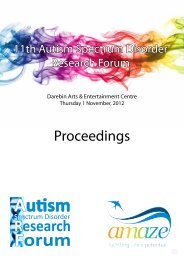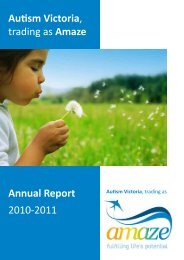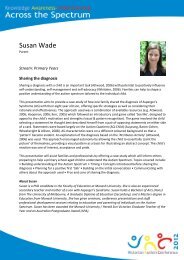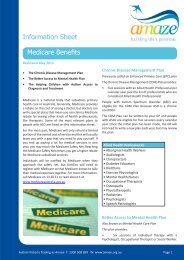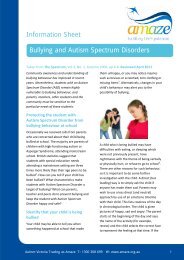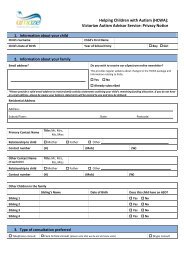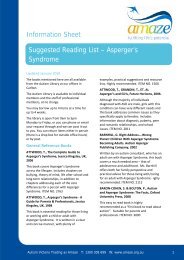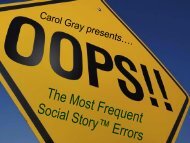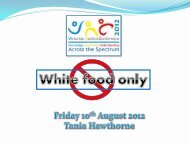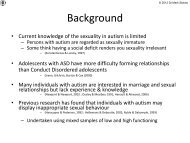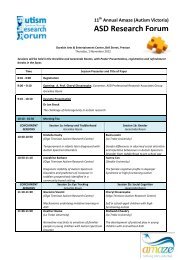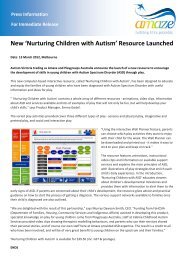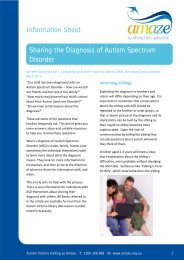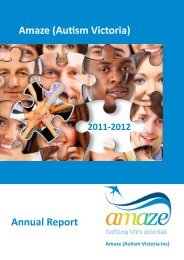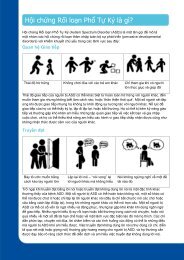Sharing the diagnosis - Amaze
Sharing the diagnosis - Amaze
Sharing the diagnosis - Amaze
You also want an ePaper? Increase the reach of your titles
YUMPU automatically turns print PDFs into web optimized ePapers that Google loves.
© Susan Wade 2012<br />
Image: Wade, S. (2012)<br />
Victorian Autism Conference, 2012
� Introduction<br />
� Before: Preparing to ‘share’<br />
� During: <strong>Sharing</strong> <strong>the</strong> <strong>diagnosis</strong><br />
� After: Building understanding<br />
� Reflections on <strong>the</strong> process<br />
� Questions<br />
© Susan Wade 2012
© Susan Wade 2012<br />
Image: Wade, S. (2012)<br />
“…[<strong>diagnosis</strong>] allows teachers and<br />
o<strong>the</strong>rs to disengage from o<strong>the</strong>rwise<br />
unhelpful labels, such as ‘lazy’, ‘rude’,<br />
‘defiant’…” (Jordan, 2003, p.212)<br />
“I'm glad I have a label. My label helps<br />
me to understand who I am and why I<br />
function as I do… we can view it as<br />
informing…” (Lawson, 2008, p.98)<br />
Self-understanding, self-management & self-advocacy<br />
Jordan, 2003; Lawson, 2008; Shore, 2004; Whitaker , 2006
Abilities,<br />
Achievement<br />
& <strong>the</strong> Autism<br />
Spectrum<br />
Seeking participants…<br />
Adults on <strong>the</strong> autism spectrum (with a <strong>diagnosis</strong>)<br />
& people with knowledge of individuals on <strong>the</strong> autism<br />
spectrum (any age with a <strong>diagnosis</strong>) who can help us learn<br />
about high abilities and achievements.<br />
Adults with ASD<br />
Parents Teachers Psychologists Mentors<br />
achievements Asperger’s<br />
autism capacity creativity<br />
education gifted high abilities<br />
intelligence interest<br />
learning strengths successes<br />
talent twice-exceptional<br />
Coaches<br />
This research has obtained ethics clearance from <strong>the</strong> Monash University Ethics Committee CF11/3664 - 2011001929<br />
To find out more…<br />
Follow link to <strong>the</strong> online<br />
questionnaire &<br />
full study details:<br />
http://tinyurl.com/monasheducation<br />
Or contact <strong>the</strong> researcher:<br />
Susan.Wade@monash.edu
Felt part of a<br />
community<br />
Increased<br />
self-worth<br />
Explained<br />
difference<br />
If only I had it<br />
earlier<br />
Useful for selfadvocacy<br />
© Susan Wade 2012<br />
Advantages<br />
Disadvantages<br />
Defines <strong>the</strong><br />
person<br />
Does not<br />
guarantee help<br />
Possible low<br />
expectations<br />
Source: Unpublished data from my PhD study<br />
“Abilities, Achievement & <strong>the</strong> Autism Spectrum” under <strong>the</strong> supervision<br />
of Dr. Leonie Kronborg, Faculty of Education, Monash University
Parent of a<br />
10yo boy<br />
with<br />
Asperger’s.<br />
USA<br />
© Susan Wade 2012<br />
“My child has always known of his <strong>diagnosis</strong>.<br />
We have explained that it just like us being<br />
Hispanic, it is a large part of who you are as<br />
a person but it is not all of who you are. It<br />
brings with it some good things and some<br />
bad things. Some people will judge you by it<br />
which is unfair but just how things go. It is not<br />
an excuse for not trying your best. Most<br />
people have difficulty thinking outside of<br />
<strong>the</strong>ir box but he can not only think outside<br />
<strong>the</strong> box but travel in his own Tardis [Dr. Who<br />
time machine] and explore <strong>the</strong> world and<br />
be brilliant.”<br />
Source: Unpublished data from my PhD study<br />
“Abilities, Achievement & <strong>the</strong> Autism Spectrum” under <strong>the</strong> supervision<br />
of Dr. Leonie Kronborg, Faculty of Education, Monash University
© Susan Wade 2012<br />
Image: Wade, S. (2012)
© Susan Wade 2012<br />
Help with weaker<br />
areas<br />
Advocacy &<br />
education<br />
Building on<br />
strengths<br />
Image: Wade, S. (2010)
� Introduction<br />
� Before: Preparing to ‘share’<br />
� During: <strong>Sharing</strong> <strong>the</strong> <strong>diagnosis</strong><br />
� After: Building understanding<br />
� Reflections on <strong>the</strong> process<br />
� Questions<br />
© Susan Wade 2012
© Susan Wade 2012<br />
Image: Wade, S. (2012)<br />
Talking, writing, exercise and TIME!
Ross W.<br />
Greene, PhD<br />
(The Explosive<br />
Child, p. 88)<br />
© Susan Wade 2012<br />
“... If you haven’t already, you may have to<br />
come to grips with <strong>the</strong> fact that your child a<br />
little different. Yours is not a ‘business as<br />
usual’ child. So if you were hoping for <strong>the</strong><br />
standard, easygoing child, it’s not in <strong>the</strong><br />
cards.”<br />
“...Luckily, <strong>the</strong> definition of good parenting<br />
(and good teaching) is ‘being responsive to<br />
<strong>the</strong> hand you’ve been dealt.’”
© Susan Wade 2012<br />
Image: Wade, S. (2012)<br />
Reading & listening
Image: Wade, S. (2011)<br />
Age, ‘need-to-know’, & ability to understand
© Susan Wade 2012<br />
Image: Wade, S. (2012)<br />
Self-knowledge, self-descriptive language
Individual differences, strengths & weaknesses<br />
© Susan Wade 2012<br />
Image: Wade, S. (2012)
© Susan Wade 2012<br />
Image: Wade, S. (2012)<br />
Personalised, interactive & fun
� Introduction<br />
� Before: Preparing to ‘share’<br />
� During: <strong>Sharing</strong> <strong>the</strong> <strong>diagnosis</strong><br />
� After: Building understanding<br />
� Reflections on <strong>the</strong> process<br />
� Questions<br />
© Susan Wade 2012
‘Black & white’<br />
Likes routines thinker to<br />
Liked be <strong>the</strong> reading same<br />
transport books at<br />
kinder<br />
‘Shades of grey’<br />
Happy with<br />
thinker<br />
changes<br />
Liked to pretend routines play<br />
at kinder<br />
Statements developed in part from <strong>the</strong> Autism Quotient (AQ-Child) (Auyeung, Baron-Cohen, Wheelwright & Allison, 2008)<br />
© Susan Wade 2012<br />
Appeals to motivation & strengths
Child ‘paints a picture’ of <strong>the</strong>mselves, a ‘pattern’ is revealed<br />
© Susan Wade 2012
© Susan Wade 2012<br />
Adapted from <strong>the</strong> ‘Attribute s Activity’ (Attwood, 2006)
© Susan Wade 2012<br />
Image: Wade, S. (2012)<br />
Hoopman, K. (2006). All cats have Asperger syndrome.
What we did<br />
What we said<br />
© Susan Wade 2012<br />
Words we<br />
prefer to use<br />
Words we<br />
prefer not to<br />
use<br />
Providing a summary to key people…
© Susan Wade 2012<br />
enquiries@disclosingaspergers.com
� Introduction<br />
� Before: Preparing to ‘share’<br />
� During: <strong>Sharing</strong> <strong>the</strong> <strong>diagnosis</strong><br />
� After: Building understanding<br />
� Reflections on <strong>the</strong> process<br />
� Questions<br />
© Susan Wade 2012
Initial<br />
talk<br />
© Susan Wade 2012<br />
TV<br />
Characters<br />
Strengths<br />
Problems<br />
Disability /<br />
Difference<br />
Child initiated, resources ready
weennee. (2010) Dibo and Dragon birthday party: Flickr.<br />
http://creativecommons.org/licenses/by-nc-nd/2.0/deed.en<br />
© Susan Wade 2012<br />
� Very smart!<br />
� Likes telling people what he knows.<br />
� Loves science experiments.<br />
� Hates being out in bad wea<strong>the</strong>r.<br />
� Conquered a fear through<br />
learning<br />
about something.<br />
Cro from ‘Dibo <strong>the</strong> Gift Dragon’…
� called<br />
‘Professor’<br />
C-3PO<br />
�Always telling<br />
people answers<br />
�Very smart<br />
�Worries a lot!<br />
� Jumps to conclusions<br />
� Misinterprets what o<strong>the</strong>rs say<br />
© Susan Wade 2012<br />
Sio Bibble<br />
Image: Wade, S. (2012)<br />
Rune Hakko<br />
� Grumpy<br />
when<br />
things don’t<br />
go to plan<br />
� Likes to<br />
follow rules<br />
Star Wars characters…
© Susan Wade 2012<br />
Image: Wade, S. (2012)<br />
Disability & difference
� Introduction<br />
� Before: Preparing to ‘share’<br />
� During: <strong>Sharing</strong> <strong>the</strong> <strong>diagnosis</strong><br />
� After: Building understanding<br />
� Reflections on <strong>the</strong> process<br />
� Questions<br />
© Susan Wade 2012
Timing, individualised, positive focus, & preparation<br />
© Susan Wade 2012<br />
Image: Wade, S. (2012)
© Susan Wade 2012<br />
Image: Wade, S. (2012)<br />
Refine ‘See Me’ activity, discuss complexity
© Susan Wade 2012<br />
-<br />
+
© Susan Wade 2012
Attwood, T. (2006). The complete guide to Asperger's syndrome. London: Jessica Kingsley Publishers.<br />
Auyeung, B., Baron-Cohen, S., Wheelwright, S., & Allison, C. (2008). The Autism Spectrum Quotient: Children’s Version (AQ-Child).<br />
Journal of Autism and Developmental Disorders, 38(7), 1230-1240. doi: 10.1007/s10803-007-0504-z<br />
Baron-Cohen, S. (2000). Is Asperger's syndrome/High-Functioning Autism necessarily a disability? , 1-13. Retrieved from<br />
http://www.geocities.com/CapitolHill/7138/lobby/disability.htm<br />
Eisenmajer, R. (2006). Imagine having Asperger's Syndrome - a first consultation. Melbourne: PerformArts Pty Ltd.<br />
Greene, R. W. (2005). The Explosive Child: A new approach for understanding and parenting easily frustrated, chronically inflexible<br />
children. New York, Harper.<br />
Hoopman, K. (2006). All cats have Asperger syndrome. London: Jessica Kingsley Publishers.<br />
Kerr, K. (2005). <strong>Sharing</strong> <strong>the</strong> <strong>diagnosis</strong>. The Spectrum, 1(4), 4-8.<br />
Lawson, W. (2008). Concepts of normality: The autistic and typical spectrum. London: Jessica Kingsley Publishers.<br />
Shore, S. (Ed.). (2004). Ask and tell: Self-advocacy and disclosure for people on <strong>the</strong> autism spectrum. Shawnee Mission, KS: Autism<br />
Asperger Publishing Co.<br />
Whitaker, P. (2006). 'Why's it all so difficult?' <strong>Sharing</strong> <strong>the</strong> <strong>diagnosis</strong> with <strong>the</strong> young person. In D. Murray (Ed.), Coming out Asperger:<br />
Diagnosis, disclosure and self-confidence (pp. 125-142). London: Jessica Kingsley Publishers.<br />
I would like to acknowledge <strong>the</strong> outstanding professional support that<br />
Dr. Richard Eisenmajer has provided our family as we have navigated our way<br />
from <strong>the</strong> point of <strong>diagnosis</strong>. His insightful and empa<strong>the</strong>tic understanding of <strong>the</strong><br />
autism spectrum has helped our family immeasurably.<br />
© Susan Wade 2012
© Susan Wade 2012<br />
Susan.Wade@monash.edu



